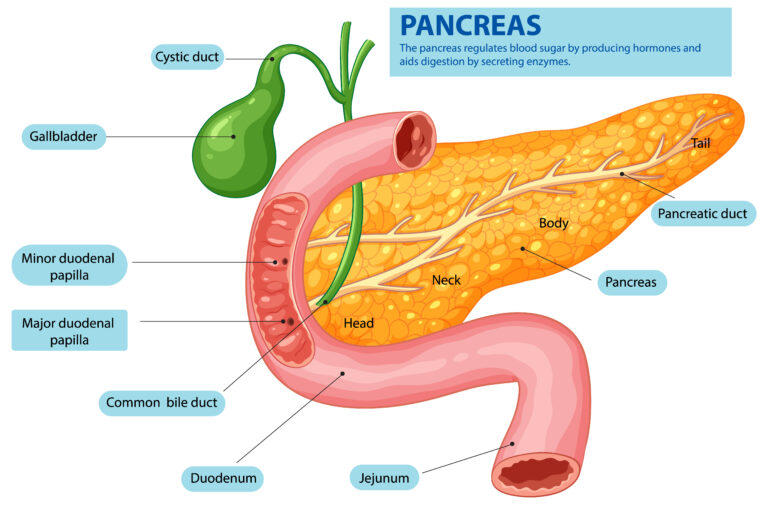learn about the best diet for Exocrine Pancreatic insufficiency . Discover the ultimate dietary strategies for managing Exocrine Pancreatic Insufficiency (EPI).

Introduction:
Exocrine Pancreatic Insufficiency (EPI) can turn eating into a challenging experience. Did you know that approximately 25-50% of people with chronic pancreatitis develop EPI? This condition significantly impacts nutrient absorption, making dietary management crucial for maintaining health and well-being. In this comprehensive guide, we’ll explore the most effective dietary approaches to manage EPI, helping you reclaim your nutritional balance and improve your overall quality of life!
Understanding Exocrine Pancreatic Insufficiency and Nutrition
Exocrine pancreatic insufficiency (EPI) happens when the pancreas doesn’t make enough digestive enzymes to break down food properly. This can lead to some pretty big challenges, like trouble absorbing fats, proteins, and vitamins, which are essential for your body. Common issues include fatty stools (steatorrhea), diarrhea, weight loss, and even vitamin deficiencies (especially A, D, E, and K). Over time, these can lead to muscle loss and other nutritional problems. Thankfully, there’s a solution: Pancreatic Enzyme Replacement Therapy (PERT). By taking these enzyme supplements with meals and snacks, and adjusting the dose based on how much fat you’re eating, you can greatly improve digestion and nutrient absorption. With PERT, managing EPI gets a lot easier, helping you feel more like yourself again!
diet for exocrine pancreatic insufficiency: Macronutrient Balance for EPI Patients
Navigating nutrition with EPI requires a strategic approach to macronutrients. Unlike standard dietary recommendations, EPI patients must carefully balance fat, protein, and carbohydrate intake. The traditional low-fat diet approach is evolving, with emerging evidence supporting medium-chain triglyceride (MCT) diet strategies. MCTs are unique because they’re more easily absorbed, offering a metabolic lifeline for those with compromised digestive systems. Meeting caloric needs becomes a nuanced challenge, requiring patients to focus on nutrient-dense foods that provide maximum nutritional value with minimal digestive stress.
diet for exocrine pancreatic insufficiency: Essential Dietary Modifications
When managing EPI, not all foods are created equal. Certain foods can exacerbate symptoms and impede nutrient absorption, making dietary modifications crucial. High-fat, greasy, and complex foods become potential adversaries in your nutritional journey. Instead, patients must pivot towards easily digestible, nutrient-rich food groups that support digestive health. Lean proteins, specific fruits and vegetables, and carefully selected carbohydrates become dietary allies. Portion control emerges as another critical strategy, with smaller, more frequent meals helping to manage digestive load. Strategic supplementation can also bridge nutritional gaps, providing targeted support where the digestive system falls short.
diet for exocrine pancreatic insufficiency: Managing Malnutrition and Nutrient Deficiencies
EPI often leads to a cascade of nutritional deficiencies that extend beyond simple dietary concerns. Vitamins A, D, E, and K—fat-soluble vitamins—are particularly vulnerable, as impaired fat absorption directly impacts their metabolism. Comprehensive blood tests become essential diagnostic tools, offering a detailed map of a patient’s nutritional landscape. Mineral deficiencies, protein malnutrition, and potential weight loss are persistent challenges. This is where collaboration with a registered dietitian becomes invaluable. These nutrition experts craft personalized strategies, transforming complex medical nutritional requirements into actionable, practical dietary plans.
diet for exocrine pancreatic insufficiency: Practical Meal Planning and Cooking Tips
Managing EPI through diet doesn’t have to be overwhelming! Here are some practical tips to make meal planning and cooking easier:
Prioritize Balanced Meals: Aim for a mix of lean proteins, healthy fats, and nutrient-dense carbohydrates. Incorporate foods rich in vitamins A, D, E, and K, like leafy greens, fortified dairy, and fatty fish.
Use PERT Wisely: Take your pancreatic enzyme supplements with every meal and snack. Match the dosage to the fat content of your meal to maximize absorption.
Choose Healthy Fats: Opt for easily digestible fats like avocado, olive oil, and nut butters in moderate amounts. Avoid overly fatty or fried foods that might worsen symptoms.
Small, Frequent Meals: Eating smaller portions throughout the day can reduce digestive strain and improve absorption.
Cook Simply: Steaming, baking, or grilling makes food easier to digest compared to frying. Use herbs and spices to flavor your meals without adding heavy fats.
Stay Hydrated: Drink plenty of water to support digestion and prevent dehydration, especially if you experience diarrhea.
Consider Fortified Foods or Supplements: Speak with your doctor or dietitian about adding fortified foods or vitamin supplements to cover any gaps in your nutrition.
By focusing on these strategies, you can enjoy nutritious, satisfying meals while effectively managing EPI symptoms.
Conclusion:
Managing Exocrine Pancreatic Insufficiency through diet is all about really getting to know your body, making necessary changes, and tailoring your approach. By putting these ideas into practice, working hand in hand with your healthcare team, and keeping yourself updated, you’ll be able to effectively handle EPI and improve your overall nutritional well-being. Don’t forget, even the tiniest dietary tweak can make a huge difference on your path to feeling great!






